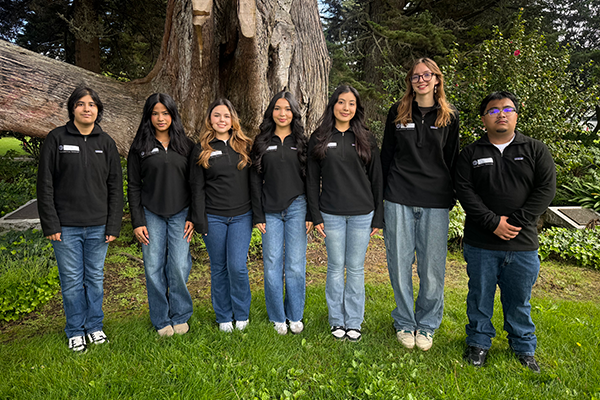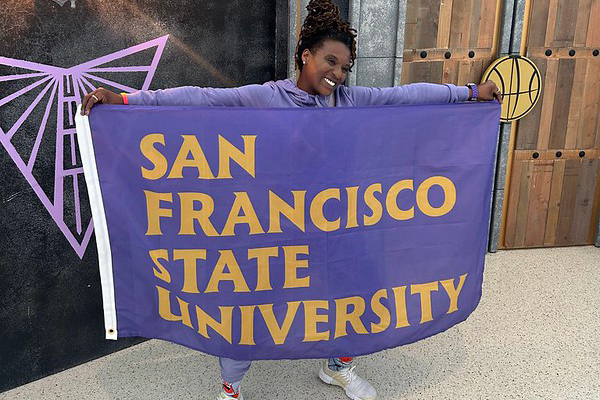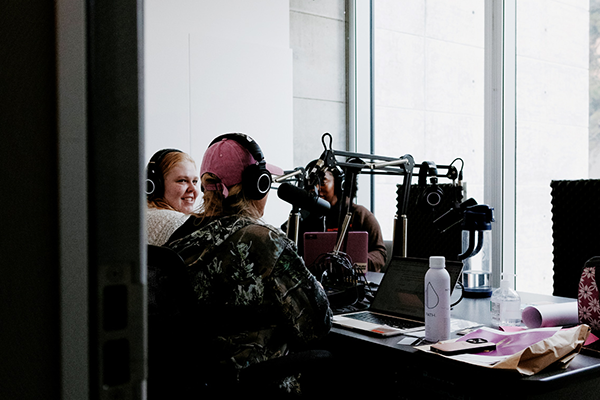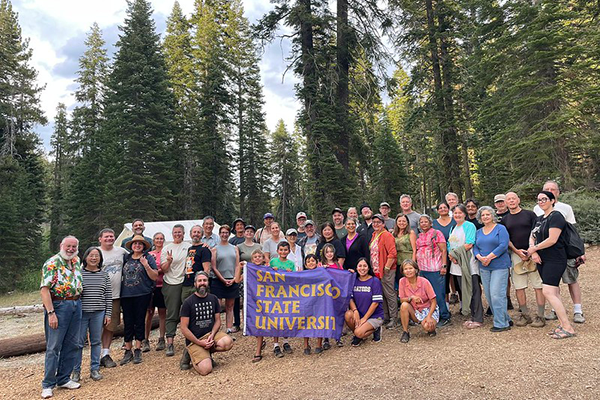News and Announcements

SFSU has announced the start of a major expansion for the University’s Presidential Scholars Program (PSP), which supports first-generation, low-income students with high grade point averages from the San Francisco Bay Area by covering the costs of tuition, housing, books and more for four years. This expansion creates a cohort of Maryam Mirzakhani scholars named in honor of the late distinguished and internationally recognized mathematician Maryam Mirzakhani, who was the first woman and first Iranian to earn the prestigious Fields Medal.
Iranian American businesswoman, community leader, philanthropist and alumna Neda Nobari (B.S., ’84) gave a gift to PSP to specifically support STEM students and to honor Mirzakhani’s inspiring legacy. The inaugural cohort started this fall 2025 semester.
“Neda’s enduring commitment to San Francisco State has had a profound impact on our campus,” SFSU President Lynn Mahoney said. “We are truly thankful for her generosity, which opens doors for countless students — particularly those overcoming financial challenges as they pursue brighter futures.”
Graduating from SFSU with a Computer Science degree, Nobari has a profound passion for helping STEM students like she once was. “My hope is that these scholarships will prioritize students pursuing careers in STEM, fields close to my heart as one of the few women in my computer science cohort over 40 years ago,” Nobari said. “My goal is that these scholarships can further diversify STEM fields, benefitting students who have tremendous ability to make a difference and to honor the legacy of Professor Mirzakhani’s extraordinary accomplishments.”

On Sept. 4, over 400 SFSU alumni and friends came out to support the WNBA’s Golden State Valkyries during their historic playoff-bound inaugural season vs. the Dallas Wings at Chase Center. Gators stopped by the Alumni Association booth to grab free swag, snap photos and reconnect with fellow alumni.

Learn how to podcast in the Digital Media Studio and MakerSpace! “Podcasting 101” takes place noon – 1:30 p.m. Monday, Sept. 22, and Thursday, Sept. 25, in Library 260. This event includes an introduction to podcasting, including recording, editing and publishing.
Please visit the Academic Technology website to learn more and RSVP for “Podcasting 101” on Monday, Sept. 22, and Thursday, Sept. 25.
Photo by Corinne Allen
The University Police Department, Information Technology Services, Facilities Services and Procurement and Support Services request campus comment and feedback for the proposed Electronic Security System University Executive Directive. This directive establishes a process for approving and implementing electronic alarm systems on campus or designated sites, ensuring compliance with information technology, Human Resources, building codes and police procedures. It also guarantees that all systems are integrated with University Police and campuswide operations.
For questions or clarification on any aspect of the updated policy, please email policies@sfsu.edu.
The Department of Child and Adolescent Development is excited to announce its ECE REWARD (Early Care Educator Recruitment for Equity in the Workforce through Academic, Retention and Development) program. The program provides financial incentives for Child and Adolescent Development undergraduate students working in Early Learning for All classrooms and family child-care homes, including up to $6,500 stipend awards per semester.
In addition to financial support, participants will receive early childhood educator-specific advising, academic and career counseling and access to learning community events to help ensure successful completion of early childhood education-related degrees. Funding is provided by the San Francisco Department of Early Childhood.

This August, the SFSU Alumni Association’s annual camping trip brought together alumni families and friends for a memorable weekend in the Sierras. Nestled in the heart of the Sierra Nevada, the Field Campus proved to be a hidden gem — offering starry nights, scenic hikes, delicious meals prepared by campus chefs and a variety of enriching workshops.
Campers explored nearby lakes and trails, including the breathtaking Sierra Buttes lookout, Upper Sardine Lake and Sand Pond. Workshops ranged from play readings and journaling to edible plant walks, bird watching and stargazing — adding a thoughtful and educational touch to the adventure.
Evenings were spent around the bonfire, where marshmallows were roasted, stories were shared and connections deepened. Old friendships were rekindled, and new ones blossomed in the glow of the firelight.
Do you have an interest in incorporating climate change and/or climate justice into your pedagogy? Climate HQ supports climate justice teaching at SFSU through Climate Justice Faculty Learning Communities. Modeled on the Center for Equity and Excellence in Teaching and Learning’s teaching squares, these communities will meet regularly throughout the semester to support each other and share best practices for teaching and learning focused on climate justice pedagogies.
The Climate HQ Faculty Learning Communities will take place in spring 2026. Each community should consist of three to six faculty, staff or students. Both interdisciplinary groups and people within departments/disciplines are encouraged to apply.
The communities should meet to work on their project for 10 hours over the course of the semester, using curated resources to create a proposed pedagogical outcome including: syllabus change, readings list, assignment/exercise, lectures, project-based collaboration between departments, community collaboration and/or organization of a Climate HQ event for campus.
A $500 honorarium is provided. Apply by 5 p.m. Friday, Nov. 7. View the call for proposals for application instructions and examples of completed projects.
For questions, please email Climate HQ Faculty Learning Communities coordinator Carolina Prado at carolinaprado@sfsu.edu.
Are you interested in working on climate change/justice in your research, scholarship or creative activities? SFSU’s Climate HQ aims to strengthen climate justice teaching, research and outreach on campus. Climate HQ supports efforts to mitigate climate change and to address climate impacts through interdisciplinary mini-grants that bring researchers from different fields together to address climate justice goals.
These one-time mini-grants will seed and support interdisciplinary research, scholarship and creative activities. Three to six grants between $5,000 and $14,000 each will be awarded (award period is January-December 2026). Applications are sought from teams comprised of at least two people who specialize in different disciplines, including at least one tenured/tenure-track faculty.
The mini-grants’ goals are to:
- support faculty members incorporating climate change/justice into their research, scholarly and creative activities for the first time
- deepen their inquiries into climate change/justice in a new way
- facilitate connections among faculty engaged in climate research, scholarship and creative activities across campus and in the community
Apply by 5 p.m. Friday, Nov. 21. View the call for proposals for application instructions and examples of completed projects.
For questions, please email Climate HQ Faculty Mini Grants coordinator Carolina Prado at carolinaprado@sfsu.edu.
Are you on track with developing your web content with the Office of Strategic Marketing and Communications? The deadline for new content is Friday, Oct. 31. The team is ready to help you move forward. Reach out via email at marcomm@sfsu.edu and learn more about the website redesign project.
The SFSU Academic Senate met on Tuesday, Sept. 16, via Zoom.
The Senate:
- Adopted by general consent:
- Substantive decrease in units for the Bachelor of Arts in Japanese
- Heard in first reading:
- Revision to Policy on Assigned Time for Exceptional Levels of Service to Students, No. S18-271
- Bachelor of Arts in Video Games Studies: New program
- Specialist in Blood Bank Technology Certificate: New program
- Heard in first reading to rescind existing policies:
- Academic Affirmative Action Policy Statement, No. S99-124
- Annual SFSU Retreats, No. S93-185
- Passed the following curricular changes:
- Bachelor of Science in Environmental Studies, concentration in Natural Resource Management
- Bachelor in Music, concentration in Performance
Prospective students are invited to join one of two information sessions to learn about the Department of Child and Adolescent Development’s undergraduate programs, opportunities for students and admissions.
Schedule:
- Monday, Sept. 22, noon – 1 p.m.
- Tuesday, Oct. 28, 6 – 7 p.m.
The “AI Literacy Essentials: Introduction to Generative AI” course introduces generative artificial intelligence (AI) to those with little or no prior experience engaging with this emerging technology. It will take place Wednesday, Sept. 24, 2 – 3:30 p.m., via Zoom.
Participants obtain a foundational understanding of generative AI, its associated opportunities and implications and basic strategies for composing and iterating prompts. Participants will engage in hands-on interaction with the Microsoft Copilot chatbot to begin generating practical outputs for personal and professional use cases.
This course is an elective that counts toward receiving a digital badge for the AI Literacy Education Program.
The Health Equity Institute’s Reproduction and Health Equity working group invites faculty interested in collaboration at the intersection of reproduction and health equity to join its first meeting of the year Wednesday, Sept. 24, 2 – 4 p.m., in HSS 345. This meeting will be a chance to reconnect and begin planning activities and collaborations for this year.
Please email Sepideh Modrek at smodrek@sfsu.edu for a Zoom option.
The “Maker Lounge” event is a creative open space to design custom 3D prints, explore Arduino micro-controllers, collaborate on hands-on projects and utilize open time to work on personal projects. This event will take place, Wednesday, Sept. 24, 3 – 6 p.m. in Library 260.
Please visit the Academic Technology website to learn more and RSVP for the “Maker Lounge” event.
The “AI Literacy Essentials: Prompting for Practical Applications” course offers a focused exploration of prompting and iteration strategies for generative artificial intelligence (AI) chatbots like Microsoft Copilot. It will take place Thursday, Sept. 25, 10:30 a.m. – noon, via Zoom.
Through collaborative, hands-on activities and interactive exercises, participants will learn to write clear, effective prompts, apply refinement techniques such as prompt chaining, and assess AI-generated outputs for accuracy and relevance to achieve more reliable and useful results in a variety of academic and non-academic contexts.
This course is required to receive a digital badge for the AI Literacy Education Program.
The University Budget Committee (UBC) invites the campus community to its second meeting of the semester on Thursday, Sept. 25, 10 a.m. – noon, via Zoom.
The agenda includes discussions on reserves and costs for consultant services and presentations on institutional resiliency projects.
UBC members represent staff, faculty, students and administrators. They offer virtual office hours on Friday, Sept. 26, 11 a.m. – noon, for conversations about budget-related matters.
Please visit the UBC page to access slideshows and minutes from past meetings or request the recording from a recent meeting. Please RSVP for the meeting and office hours by emailing the UBC at ubc@sfsu.edu.
The Lam Larsen Initiative for Emerging Technologies is excited to announce its upcoming webinar, “AI Agents in Business Games: A Case Study with WatsonX.ai and ERPsim,” on Friday Sept. 26 at 11 a.m. via Zoom.
Join a deep dive into the intersection of artificial intelligence and experiential learning. In this session, you’ll explore how IBM’s WatsonX.ai, a cutting-edge cloud-based artificial intelligence (AI) and machine learning platform, can enhance both gameplay and pedagogy through games. From real-time data management to autonomous gameplay strategies, the speakers will demonstrate how WatsonX can serve as both a support system for students and a training ground for AI agents—enabling simulations where machines learn to make strategic enterprise resource planning (ERP) decisions in dynamic, real-world-like business scenarios.
Speakers Florian Eckhard and Philipp Landler are doctoral students in Information Systems at the Technical University of Munich. Eckhard focuses on AI applications in education, including machine learning, computer vision and intelligent feedback systems, with a strong foundation in software development and serious games. Landler specializes in ERP systems, simulation-based learning and cloud-based software architectures. He has led the development of educational tools that connect business processes with gamified simulations. Together, they bring a rich perspective on how emerging AI platforms like WatsonX can transform learning and decision-making in enterprise environments.
Explore virtual reality (VR) and spatial computing with hands-on VR/extended reality (XR) and Vision Pro demos on Friday, Sept. 26, noon – 3 p.m., in Library 260. Create your own experiences and test your skills on a retro gaming console.
Are you a proud “Gator²” — an alum who’s also a staff or faculty member? Then join the Alumni Association for a special morning of connection and campus exploration on Wednesday, Oct. 15, 10 a.m. – noon.
Kick things off with a private tour of the Science & Engineering Innovation Center, followed by coffee and sweet treats at Carmelina’s Café. This is an opportunity to reconnect with fellow “Gator²” colleagues, discover what’s new on campus and celebrate SFSU’s vibrant community.
Admission is free; registration is required. Space is limited. Register by 8 a.m. Wednesday, Oct. 8.
For questions, please email Marciana Flores at mfloresa@sfsu.edu.
Global business leaders Laxman Narasimhan and Chris Larsen (B.S., ’84) are coming to campus to share their insights at a Lam-Larsen Distinguished Lecture Series event. Narasimhan, former CEO of Starbucks and Reckitt and former global chief commercial officer of PepsiCo, will take part in a fireside chat with Larsen, co-founder and executive chairman of Ripple Inc. The program takes place Tuesday, Oct. 28, 11 a.m. – 1 p.m., at the Seven Hills Conference Center.
Their conversation, “The Power of Purpose: Strategic Leadership Lessons from the C-Suite,” will explore how purpose-driven leadership shapes brand values, innovation and long-term success. Narasimhan will discuss his experience leading iconic consumer brands through change, while Larsen will offer his perspectives as a financial-technology pioneer and proud SFSU alumnus and supporter.
Admission is free, but registration is required by Monday, Oct. 20, at 1 p.m. Learn more and register.
The CSU Employee Fee Waiver program provides opportunity for eligible employees to attain a credential, undergrad or grad degree as part of career development or to enhance work-related skills. Human Resources and Graduate Studies will host a virtual information session Friday, Oct. 10, 2 – 3 p.m., for employees interested in earning their master’s at SFSU. For all other uses of the fee waiver including for employee dependents, please attend the general fee-waiver presentation on Friday, Nov. 7, 2 – 3 p.m.
SF State Spotlight
Rachel Flynn, associate professor of Child and Adolescent Development, has played a key role in the creation of the NIH Baby Toolbox, a first-of-its-kind assessment system that measures cognitive, motor and social-emotional development in children from 1 to 42 months old.
Available to researchers and clinicians nationwide, the NIH Baby Toolbox is administered entirely on an iPad, offering modern, efficient alternatives to traditional assessments that are often costly and time-consuming. With gaze- and touch-based tasks, automated scoring and availability in both English and Spanish, the system provides accessible, standardized tools for assessing development across diverse populations.
Flynn recently co-authored three papers in a special issue of Infant Behavior and Development highlighting the toolbox. Her lead contribution focused on executive function and memory measures: new tools that evaluate skills such as memory and attention, which are crucial for later learning and achievement. She also contributed to papers on the methodology and norming of the toolbox and on its innovative use of automated gaze detection technology.
The Baby Toolbox allows researchers and clinicians to track normative developmental progress and identify areas of concern that may require intervention by providing developmental assessments that are reliable, easy to use and accessible.
Recreation, Parks, Tourism and Holistic Health Professor Erik Peper gave an interview to the “Heart Rate Variability Podcast” on Aug. 22 to discuss pain and pain management.